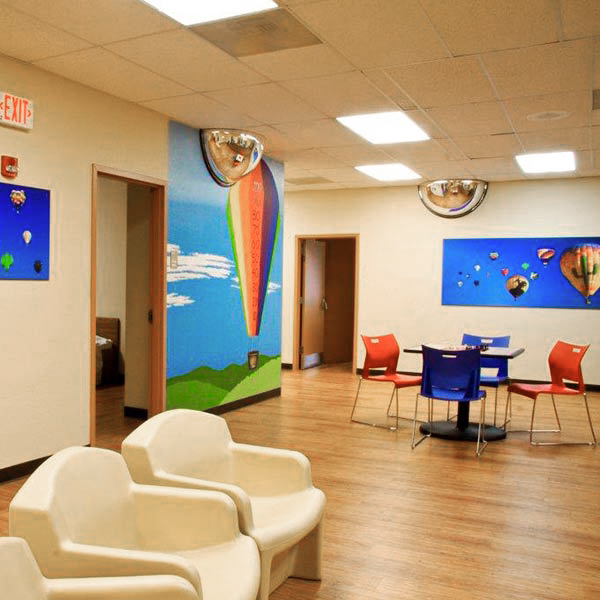Sonora Behavioral Health Hospital is dedicated to providing superior treatment to children, teens, and adults suffering from conduct disorder. Located in Tucson, Sonora provides the comprehensive care needed to successfully manage mental health disorders and lead a life of recovery.
Treatment for Conduct Disorder
Learn More About Treatment for Conduct Disorder
Extremely disruptive behavioral and emotional problems are the cornerstone to the mental illness known as conduct disorder. Typically affecting children and adolescents, this mental health condition involves compulsions to break rules or laws, instigate violent or aggressive behavior, belligerently act out, and cause unnecessary damage to property. These symptoms can often lead to damaging consequences like getting in trouble at school or in the community, abusing drugs or alcohol, and possibly physical injury as a result of acting out behaviors. For those who do not seek treatment at a psychiatric hospital in reducing or halting these emotional and behavioral disturbances, long-term effects, such as incarceration, could have a greater chance of occurring.
Sonora Behavioral Health, a 140-bed acute inpatient psychiatric hospital in Tucson, is a premier provider of treatment for children, adolescents struggling with behavioral health issues such as conduct disorder. We acknowledge the unique needs of patients who are struggling with mental health concerns and diligently work with patients and their families in working towards recovery. With treatment that is designed to address every aspect of mental health conditions, like conduct disorder, we at Sonora implement treatment modalities and techniques geared towards alleviating distressing symptoms and restoring healthy functioning.
Helping a Loved One
Helping a Loved One or Family Member Get Treatment
Parenting a child or adolescent who has conduct disorder is not without its challenges. You may receive calls from school or law enforcement regarding your child’s behavior and reports that he or she is going against age-appropriate methods of rebelling. You may witness excessive emotional distress that goes beyond what most would consider a temper tantrum. The important thing to know is that there are ways of helping your child or adolescent overcome these emotional and behavioral instabilities. To know if your child is suffering from conduct disorder, consider the following:
- Is your child overly aggressive towards others in his or her actions or words?
- Does your child seem easily agitated or frustrated by even the smallest issues?
- Is your child abusive towards animals?
- Have you received reports that your child has damaged property?
- Have you received call from your child’s school that he or she is acting out or being overtly disrespectful?
- Has your child been reported as a bully of others?
A consultation with a mental health professional at a treatment center can determine if your child is struggling with symptoms congruent with conduct disorder. Once a conclusive diagnosis is made, appropriate treatment can begin. Should this occur, it is crucial that parents and family members be supportive of the child or adolescent throughout the healing and recovery process.
Why Choose Us
Why Consider Treatment at Sonora Behavioral Health
Worsening emotional and behavioral problems and more severe consequences could be the result for those who do not receive treatment for conduct disorder. Furthermore, symptoms can sometimes carry over into adulthood, causing even more impairment. And because some other effects of this mental illness include the development of substance abuse problems leading to addiction and the manifestation of other mental health conditions, the future of a person with untreated conduct disorder can be grim.
Inpatient treatment at a psychiatric hospital can be extremely beneficial for children and adolescents who are struggling with conduct disorder. The secure and safe environment that is provided in our inpatient treatment center offers a protected space for children and adolescents in Tucson to go through the process of recovery. Through the use of proven therapeutic interventions that build skills necessary for healthy functioning, inpatient treatment can teach those suffering from conduct disorder how to manage their emotions and understand the impact of destructive behaviors on their lives. Finally, parents of these children and adolescents are able to gain a better understanding of their child’s unique needs, learn new beneficial methods of parenting, and receive support from professionals who understand the hardships involved in parenting a child with this mental illness. The primary focus of this kind of treatment is to stabilize and treat children and adolescents so that they and their families can go to lead happy healthy lives.
Philosophy & Benefits
Conduct Disorder Treatment Philosophy and Benefits
As the leading psychiatric treatment center in Tucson, we make it our mission to provide behavioral healthcare services that meet the needs of our patients. We employ evidence-based treatment modalities and proven techniques that teach effective coping skills that can be used long after discharge. Our experienced and compassionate staff diligently work to provide comprehensive medical and psychiatric assessments, diagnostic services, and treatment. By treating acute illnesses in a sensitive and caring manner, Sonora’s staff is able to assist patients in regaining and maintaining their highest level of functioning.
Types of Treatment
Types of Treatment Offered at Sonora Behavioral Health Hospital
Upon arrival at Sonora, each patient will complete an initial assessment that will include a physical examination, collection of medical history, psychiatric evaluation, and psychological assessment. During this time, we will also identify already-existing positive skills, cultural and family issues, and determine any other needs that each patient may have. We use a multidisciplinary approach with each patient. Our psychiatric clinical team is composed of psychiatrists, nurses, social workers, therapists, physicians, and expressive art therapists who are all trained and experienced in treating individuals with emotional health and substance abuse issues. All treatment plans are individualized and include the following:
Medication management: Some people require medication to alleviate the debilitating symptoms of conduct disorder. When pharmaceutical intervention meets the needs of a patient, medical staff, including nurses and psychiatrists, will work with the individual in exploring this option for treatment. Furthermore, individuals prescribed medication are monitored so as to ensure that proper medication is being administered to alleviate distressing symptoms.
Group therapy: At our leading psychiatric treatment center, our main form of treatment is daily group therapy sessions. We utilize solution-focused groups that teach patients a variety of skills needed to recover from conduct disorder. Some of our group topics include sleep, hygiene, coping skills, stress management, self-awareness, relaxation, and self-help skills training.
Family meetings: Family members are involved in all aspects of the treatment process and receive education about their child’s condition. In addition, family members are in constant communication with case managers throughout their child’s stay.
Additional treatment methods may include the following:
- Expressive therapy, including art therapy
- Recreation therapy
- Daily meetings with social worker
- Weekly dietary groups
Continuing Care
Continuing Care and Levels of Treatment
The discharge planning process begins as soon as a patient is admitted to our hospital. Within 48 hours of admission, a social worker will evaluate each patient for available resources including placement, transportation, and aftercare treatment. When it is time for the patient to leave treatment, the social worker will coordinate placement with family members, outside agencies, or private insurance. They will also coordinate transportation from the hospital on the day of discharge to the patient’s next placement as well as aftercare treatment appointments based on individual needs of each patient.
For patients that no longer require inpatient treatment, our psychiatric treatment center offers outpatient treatment that consist of nine to twelve hours of group therapy a week. These groups allow participants to process real-life scenarios as they happen and get the support they need, as well as practice the new techniques that they are learning. These eight to twelve weeks of intensive treatment give participants the chance to use group therapy to work through emotional and psychological issues that prevent ongoing healing. Through our outpatient treatment, patients learn techniques that they will continue to use for the rest of their lives to stay healthy and happy.
Our partial hospitalization program (PHP) and our intensive outpatient program (IOP) allow patients to live at home and attend school or go back to work while still receiving the treatment that they need. PHP is held 5 days a week for 6 hours a day, while IOP is held 3 days a week for 3 hours a day. Both programs have a mental health and chemical dependency track. In addition to PHP and IOP, we have an aftercare program for alumni that is held once a month for as long as patients need.
All of the services at Sonora Behavioral Health Hospital encourage patient success as individuals navigate the process of healing and recovery. For children and adolescents suffering from conduct disorder, Sonora can be the beginning of a life free from the symptoms and negative effects of this mental health condition.














